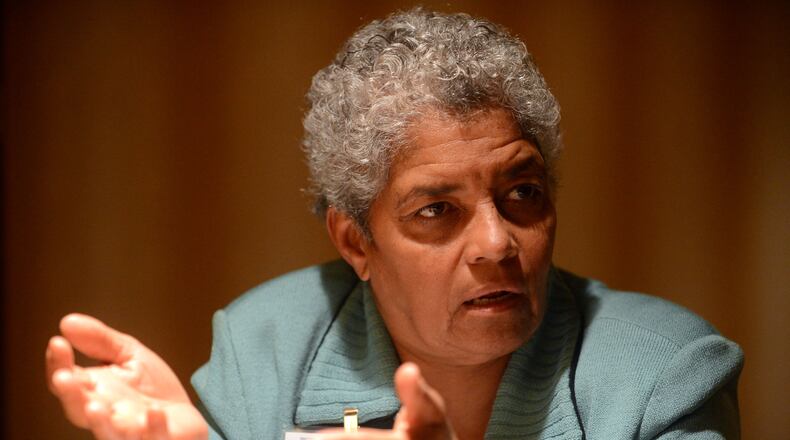Shirley Franklin is not running for office this year, but the former mayor has become a target of political warfare in Atlanta’s increasingly contentious municipal elections.
Franklin was the subject of a citywide political robocall this week, in which an unidentified caller disparaged policy decisions she made in office and her support of former Atlanta Public Schools superintendent Beverly Hall after the cheating scandal. The caller may have violated federal communications laws by failing to disclose the organization funding the attack and not giving contact information.
The “Shame on Shirley” calls were identified solely by the word “payphone” on caller ID, with a number traced back to a gas station in Union City.
While Franklin isn’t vying for a seat at City Hall, she’s supporting Matt Westmoreland and Eshé Collins for the Atlanta Board of Education. She has also endorsed Andre Dickens, who is running for the Atlanta City Council post held by H. Lamar Willis, an ally of Atlanta Mayor Kasim Reed.
Franklin’s support of Dickens runs deep and family-wide. Dickens, a Ga. Tech administrator, is a childhood friend of Franklin’s son Cabral, who with wife Candice Franklin is volunteering on the campaign.
“I don’t know what the motivation for the call was. I do know, however, that the main question for me about the call is not what was said, but the issue of integrity,” said Franklin, who recently held a fundraiser for Dickens. “Not only did they not identify themselves, which is questionable in terms of their courage and integrity, but neither did they put the issues in context.”
Franklin served as mayor between 2002 and 2010, with Reed as her campaign manager during her run for the office. The two have reportedly been less friendly since Reed’s election to her former seat in 2010.
Reed and Willis, who is facing his fourth election to the city council, are longtime friends and political partners.
In an email to supporters, the Dickens camp suggested Willis’ team was behind the attacks and unveiled a website admonishing the councilman, who in recent years has committed a string of ethical violations.
Willis, an attorney, is facing potential disbarment for violations that include depositing thousands of dollars meant for a young client into his own personal account, monies that were ultimately paid back. And in 2009, he was fined $25,000 by state officials for failing to properly register his charitable foundation before raising funds.
Reached Wednesday, Willis said he had no hand in the robocall and operates an above-the-board campaign. He and Reed have also been the subjects of anonymous robocalls in recent weeks, he said.
“This is is my fourth election. I’ve never sent a negative mail piece and I’ve never sent a robocall,” said Willis, noting Franklin has employed robocall tactics on political opponents in years past. “It doesn’t matter how many times I’ve been attacked and sort of publicly abused by my opponents. I’ve tried to stay focused on the issues of the city and that’s what I’ll continue to do.”
Lalohni Campbell, a campaign volunteer and spokeswoman for Dickens, described the robocall as a “dirty unethical tactic.” And she rebuffed rumors that the Dickens campaign itself could be behind the calls to drum up attention to their race.
“That’s ridiculous. We believe the people of Atlanta are smarter than that,” she said. “We obviously want them to be informed of the facts and make their decisions as to who is ethical and the best fit for Atlanta and who is not.”
A spokeswoman for Reed’s re-election campaign could not be reached Wednesday for comment. Calls to most the board of education candidates were not immediately returned.
Collins, however, said she was surprised to learn of the robocalls and said they were a “waste of time and resources” in the Board of Education race.
“I highly respect Mayor Franklin,” said Collins, who Franklin recently wrote about in a blog entry. “I think it’s very unfortunate that a call would go out about her because she’s not the candidate and it’s not her election cycle.”
Doug Chalmers, a political law attorney in Atlanta unaffiliated with these races, said political robocalling “is an area where people get it wrong all the time.”
According to the Federal Communications Commission, all pre-recorded calls, regardless of content, must identify the caller at the start and must disclose a phone number during the message. The “Shame on Shirley” message did neither.
Whether the caller broke federal law must be decided by the FCC, and that typically happens after someone files a complaint. Violating federal communications laws can be tough to prove and carry fines up to $16,000 per call, according to the FCC.
Clark Atlanta University political science professor William Boone speculates that these types of attacks will pick up before the Nov. 5 election. In races where the supporters are better known than the candidates they’ve endorsed, it’s not uncommon to attack the bigger name, like Franklin’s, he said.
“It suggests that whoever put this out is concerned enough to think (Franklin) has some clout and that her endorsement carries weight,” he said. “If I were Shirley, I would feel quite complimented.”
About the Author
Keep Reading
The Latest
Featured



